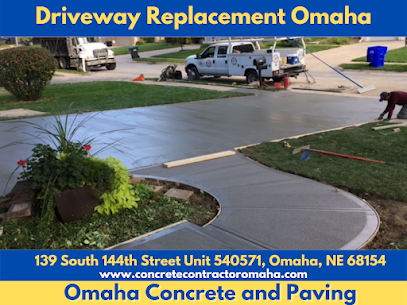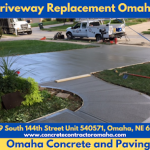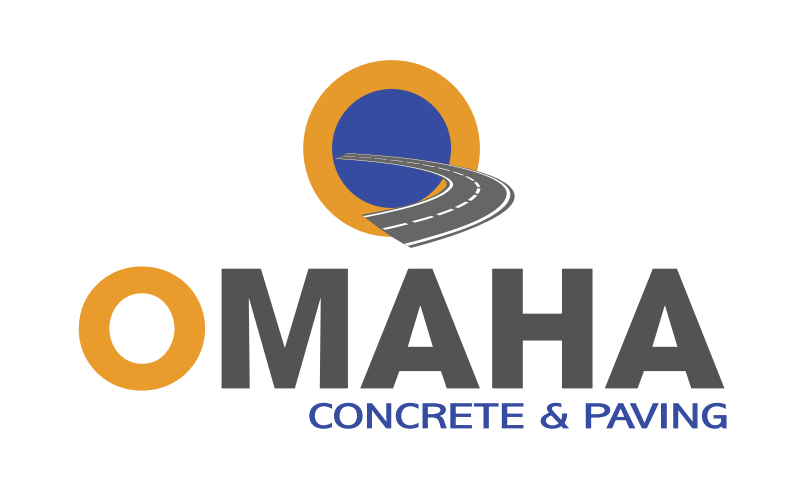HOW MUCH DOES IT COST TO REPLACE A CONCRETE DRIVEWAY?
Do you want to replace your old, cracked, crumbling driveway with a new one? Perhaps you want to personalize your home by installing a decorative concrete driveway. There is typically many different options when considering a driveway replacement. Continue reading to determine what is the best option for you.
Driveways crack for a variety of reasons, including age, vegetation, and the settling of the earth beneath, giving your home a worn appearance. Why not give your house a facelift and boost its curb appeal by installing a new driveway?
Concrete is the best material for a driveway. You can achieve the customized look of pavers or stones at a lower cost. Not only that, but the design possibilities are limitless. This gives you the opportunity to design a one-of-a-kind driveway that will impress your neighbors and increase the value of your home.
What is the cost of a concrete driveway?
The cost of your design will vary depending on its complexity. The cost of a plain gray concrete driveway ranges between $20 and $25 per square foot. Expect to pay between $12,800 and $16,000 for a 640-square-foot two-car driveway. A one-car driveway is typically 200 square feet in size, so the cost is estimated to be $5,000 to $10,000.
Assume you want to do something a little fancier with your driveway. Plan on spending $20 to $30 per square foot or more if you install a driveway with decorative colors or finishes. Expect to spend $10,000 to $30,000 or more on a two-car driveway. A single-car driveway will be less expensive.
Costs will also vary depending on location, project size, and current material and labor costs.
What factors should I consider before installing a concrete driveway in Omaha, NE?
When considering replacing your tired, old concrete driveway with a new upgrade, there are many factors to consider. Here are a few things to consider:
- Site: Where is your driveway? What is the condition of the land where you intend to build? Is your driveway slanted or curved? Does it necessitate special drainage? Are you on a hillside? These factors will have an impact on the overall cost of your driveway.
- Size: A typical two-car driveway measures 16 x 40 feet or 640 square feet in total. Many driveways vary in size depending on the distance from the street to your home or garage. You should also consider whether you will extend your driveway to accommodate an RV or a boat.
- Design: This is the area with the greatest price variation. Concrete driveways offer a wide array of design options, ranging from plain gray concrete to stamped and stained concrete that mimics the look and feel of pavers and stones. The design parameters are entirely up to you and how much money you want to spend and can range from simply incorporating color into the concrete mix to a complicated stained and stamped design.
- Thickness: Are you planning to park your RV on your concrete driveway? Consider what types of vehicles will be parked in your driveway before you begin your project. The thickness required will be determined by this. Concrete driveways must be at least four inches thick. A thicker driveway may be required to support heavy-duty vehicles or high traffic.
- Replacing a driveway: There are extra costs involved in replacing a driveway. To tear out and remove an existing driveway, you can expect to pay around $20.00 per square foot. There may be additional charges for removing the existing driveway.
- Resurfacing a driveway: Assume you want to resurface your current driveway rather than tearing it out and replacing it. The cost varies greatly depending on the design or decorative finish. Resurfacing your driveway should cost between $15 and $20 per square foot.
- Driveway sealing: A driveway sealed by professionals will charge you between $5 and $10 per square foot.
What are my options for my concrete driveway in Omaha, NE?
When it comes to installing a new concrete driveway, there are numerous options to consider. Consider the following options to help you budget:
Basic
- Costs are between $15 and $20 per square foot.
- Most cost-effective
- Textured finish (broom finish, etc.)
- Single-color (usually grey)
- Basic stencil or border
Mid-Range
- $20 to $25 per square foot
- More elaborate decorations
- Uses contrasts with patterns and colors
- Uses contrasts with patterns and colors
- Engraving
- Two or more colors or patterns (stamping)
- Two or three colors with a contrasting border
High end
- Prices start at $30 per square foot and up
- Advanced stenciling with hand-applied accents
- The ultimate in decorative concrete and custom driveways
- Borders and saw cut designs
- Hand-applied chemical stain accents
- Multiple scoring patterns and stain colors
WHAT CAN I PUT OVER CRACKED CONCRETE?
Cracks in your concrete patio, driveway, or walkway are not only a tripping hazard, but they can also detract from the curb appeal of your home. You’ve let these imperfections linger long enough. Here’s how to easily fix them!
Concrete installations can last hundreds of years, but they eventually develop small cracks, holes, gaps, and crevices. If your concrete patio, path, or driveway is beginning to show signs of wear, make the necessary repairs as soon as possible. After all, today’s small problem will only get bigger and more difficult (or expensive) to fix. While working with concrete requires a professional, in some cases, almost anyone can repair cracks in concrete.
This is how it’s done.
STEP 1: Select a concrete repair product.
Concrete cannot be used to repair concrete surfaces. Instead, use a concrete repair mix, which is widely available at home improvement stores and online. Latex patching material, epoxy compounds, and mortar mixes are all options. This last option is best for filling large cracks (or chipped edges), whereas the other products are best for filling cracks in concrete that are 18 inches wide or narrower.
STEP 2: Clean up the cracked area before patching it.
To begin, use a small hammer and chisel to remove any cracked, crumbling, or loose concrete—chip to about a one-inch depth below the surface plane. Then, thoroughly rinse the area, scrubbing with a wire brush to remove any loose, lingering particles.
Keep in mind that this is a dirty job. You might want to spread a tarp beneath the work area to make cleanup easier. Most importantly, make sure you’re wearing the appropriate safety equipment.
STEP 3: Repair the concrete crack with the repair product of your choice.
- Epoxy or latex. Apply an epoxy or latex patching product to concrete cracks ⅛-inch wide or narrower and mix according to the manufacturer’s specifications. The material is applied with either a mason’s trowel or a putty knife. Force it into the crack, then level it with the surrounding concrete. Different mixes cure in different ways; once again, refer to the instructions on your chosen product.
- Mortar Mix. Use a mortar mix to fill larger cracks in concrete. Making your own mix is as simple as combining one part Portland cement, three parts masonry sand, and just enough water to make a thick paste (though repair mortar mixes can also be purchased locally or, in some cases, online). Moisten (but do not drench) the affected area before applying the mortar mix with a mason’s trowel or a putty knife. As you work, take care to remove any air pockets by pressing firmly on the product. Finally, smooth the patch to make it flush with the surrounding concrete. Allow it to cure for about two hours before covering it with plastic sheeting to keep it moist. Sprinkle water under the plastic daily for a few days or until the surface hardens.

























